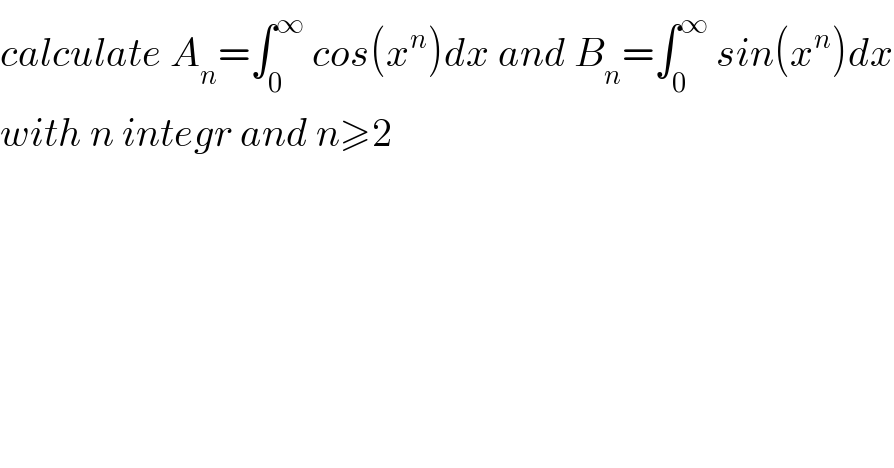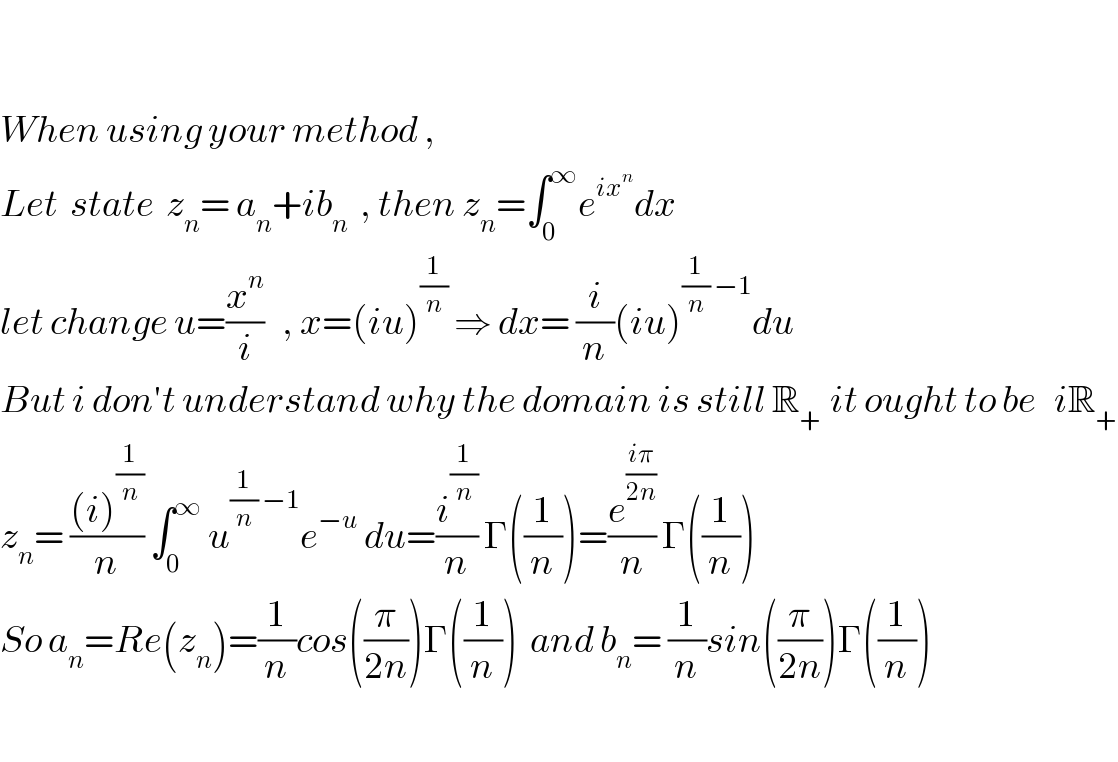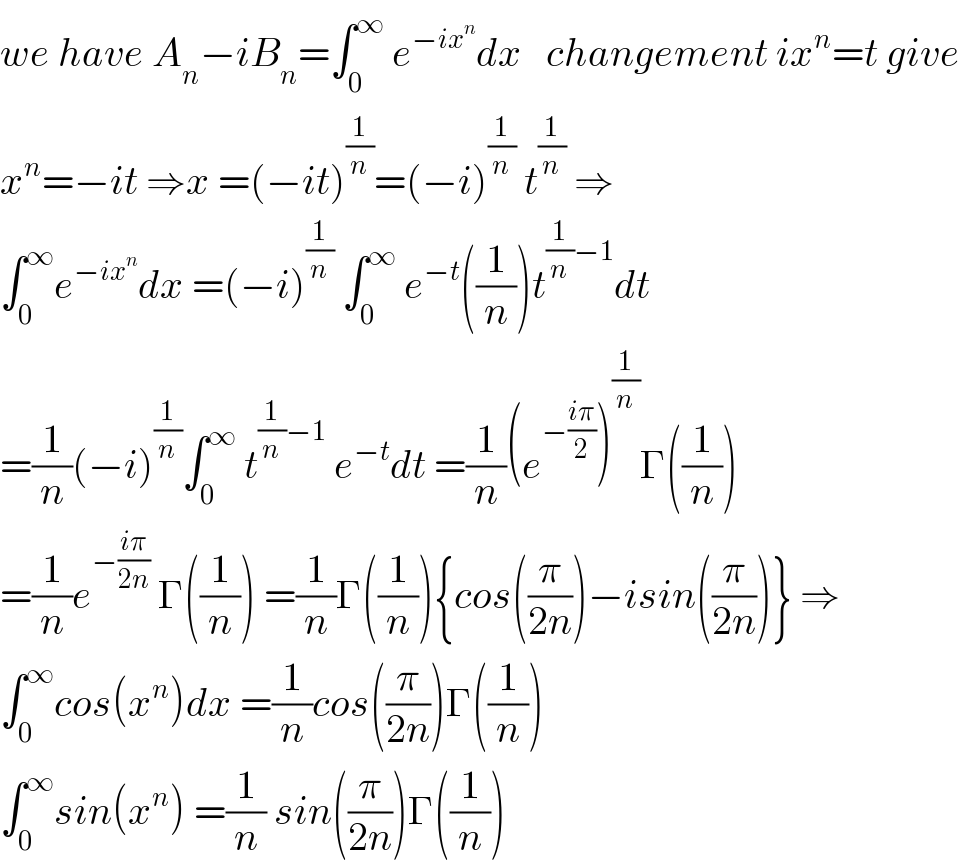Question Number 66213 by mathmax by abdo last updated on 10/Aug/19

$${calculate}\:{A}_{{n}} =\int_{\mathrm{0}} ^{\infty} \:{cos}\left({x}^{{n}} \right){dx}\:{and}\:{B}_{{n}} =\int_{\mathrm{0}} ^{\infty} \:{sin}\left({x}^{{n}} \right){dx} \\ $$$${with}\:{n}\:{integr}\:{and}\:{n}\geqslant\mathrm{2} \\ $$
Commented by ~ À ® @ 237 ~ last updated on 11/Aug/19

$$ \\ $$$$ \\ $$$${When}\:{using}\:{your}\:{method}\:, \\ $$$${Let}\:\:{state}\:\:{z}_{{n}} =\:{a}_{{n}} +{ib}_{{n}} \:\:,\:{then}\:{z}_{{n}} =\int_{\mathrm{0}} ^{\infty} {e}^{{ix}^{{n}} } {dx} \\ $$$${let}\:{change}\:{u}=\frac{{x}^{{n}} }{{i}}\:\:\:,\:{x}=\left({iu}\right)^{\frac{\mathrm{1}}{{n}}} \:\Rightarrow\:{dx}=\:\frac{{i}}{{n}}\left({iu}\right)^{\frac{\mathrm{1}}{{n}}\:−\mathrm{1}} {du} \\ $$$${But}\:{i}\:{don}'{t}\:{understand}\:{why}\:{the}\:{domain}\:{is}\:{still}\:\mathbb{R}_{+\:\:} {it}\:{ought}\:{to}\:{be}\:\:\:{i}\mathbb{R}_{+} \\ $$$${z}_{{n}} =\:\frac{\left({i}\right)^{\frac{\mathrm{1}}{{n}}} }{{n}}\:\int_{\mathrm{0}} ^{\infty} \:{u}^{\frac{\mathrm{1}}{{n}}\:−\mathrm{1}} {e}^{−{u}} \:{du}=\frac{{i}^{\frac{\mathrm{1}}{{n}}} }{{n}}\:\Gamma\left(\frac{\mathrm{1}}{{n}}\right)=\frac{{e}^{\frac{{i}\pi}{\mathrm{2}{n}}} }{{n}}\:\Gamma\left(\frac{\mathrm{1}}{{n}}\right) \\ $$$${So}\:{a}_{{n}} ={Re}\left({z}_{{n}} \right)=\frac{\mathrm{1}}{{n}}{cos}\left(\frac{\pi}{\mathrm{2}{n}}\right)\Gamma\left(\frac{\mathrm{1}}{{n}}\right)\:\:{and}\:{b}_{{n}} =\:\frac{\mathrm{1}}{{n}}{sin}\left(\frac{\pi}{\mathrm{2}{n}}\right)\Gamma\left(\frac{\mathrm{1}}{{n}}\right)\:\:\:\:\: \\ $$$$ \\ $$
Commented by mathmax by abdo last updated on 11/Aug/19

$${thank}\:{you}\:{sir}. \\ $$
Commented by mathmax by abdo last updated on 11/Aug/19

$${we}\:{have}\:{A}_{{n}} −{iB}_{{n}} =\int_{\mathrm{0}} ^{\infty} \:{e}^{−{ix}^{{n}} } {dx}\:\:\:{changement}\:{ix}^{{n}} ={t}\:{give} \\ $$$${x}^{{n}} =−{it}\:\Rightarrow{x}\:=\left(−{it}\right)^{\frac{\mathrm{1}}{{n}}} =\left(−{i}\right)^{\frac{\mathrm{1}}{{n}}} \:{t}^{\frac{\mathrm{1}}{{n}}} \:\Rightarrow \\ $$$$\int_{\mathrm{0}} ^{\infty} {e}^{−{ix}^{{n}} } {dx}\:=\left(−{i}\right)^{\frac{\mathrm{1}}{{n}}} \:\int_{\mathrm{0}} ^{\infty} \:{e}^{−{t}} \left(\frac{\mathrm{1}}{{n}}\right){t}^{\frac{\mathrm{1}}{{n}}−\mathrm{1}} {dt} \\ $$$$=\frac{\mathrm{1}}{{n}}\left(−{i}\right)^{\frac{\mathrm{1}}{{n}}} \int_{\mathrm{0}} ^{\infty} \:{t}^{\frac{\mathrm{1}}{{n}}−\mathrm{1}} \:{e}^{−{t}} {dt}\:=\frac{\mathrm{1}}{{n}}\left({e}^{−\frac{{i}\pi}{\mathrm{2}}} \right)^{\frac{\mathrm{1}}{{n}}} \Gamma\left(\frac{\mathrm{1}}{{n}}\right) \\ $$$$=\frac{\mathrm{1}}{{n}}{e}^{−\frac{{i}\pi}{\mathrm{2}{n}}} \:\Gamma\left(\frac{\mathrm{1}}{{n}}\right)\:=\frac{\mathrm{1}}{{n}}\Gamma\left(\frac{\mathrm{1}}{{n}}\right)\left\{{cos}\left(\frac{\pi}{\mathrm{2}{n}}\right)−{isin}\left(\frac{\pi}{\mathrm{2}{n}}\right)\right\}\:\Rightarrow \\ $$$$\int_{\mathrm{0}} ^{\infty} {cos}\left({x}^{{n}} \right){dx}\:=\frac{\mathrm{1}}{{n}}{cos}\left(\frac{\pi}{\mathrm{2}{n}}\right)\Gamma\left(\frac{\mathrm{1}}{{n}}\right) \\ $$$$\int_{\mathrm{0}} ^{\infty} {sin}\left({x}^{{n}} \right)\:=\frac{\mathrm{1}}{{n}}\:{sin}\left(\frac{\pi}{\mathrm{2}{n}}\right)\Gamma\left(\frac{\mathrm{1}}{{n}}\right) \\ $$
